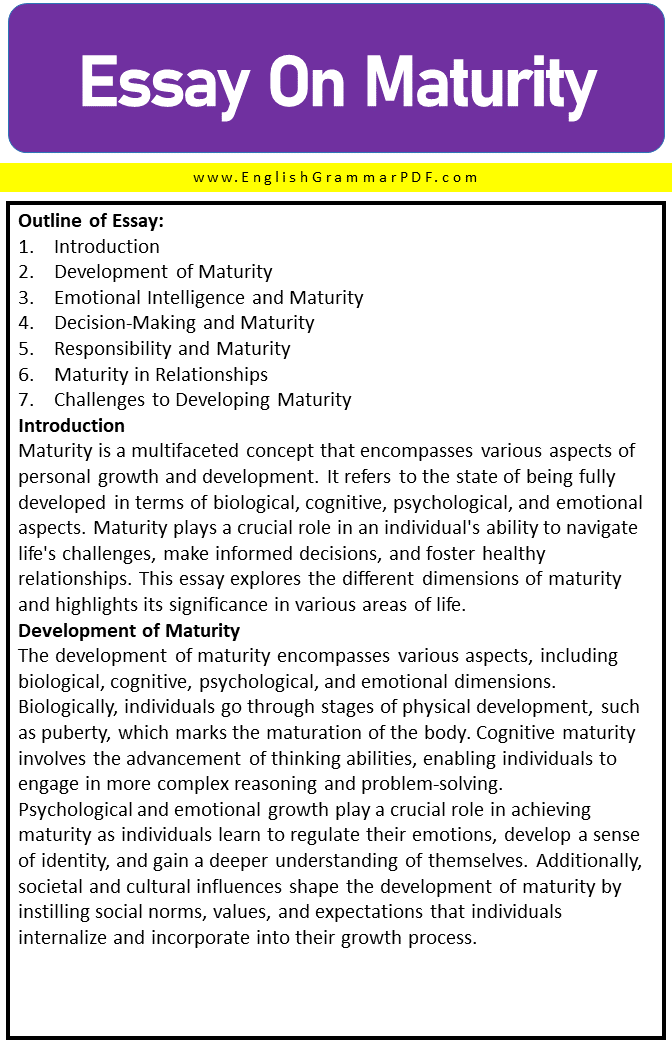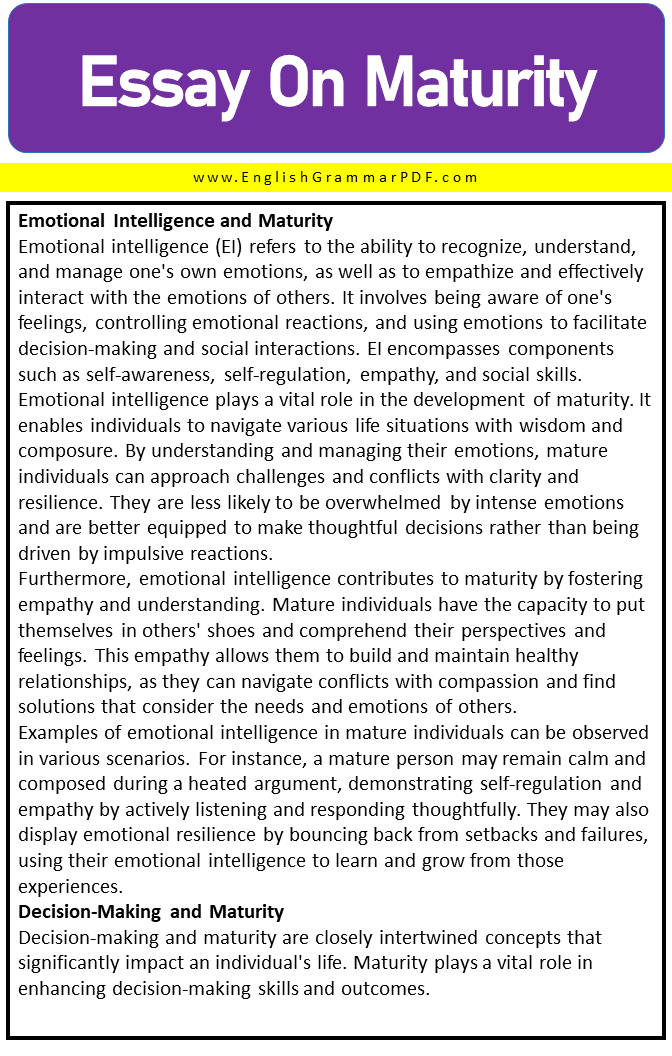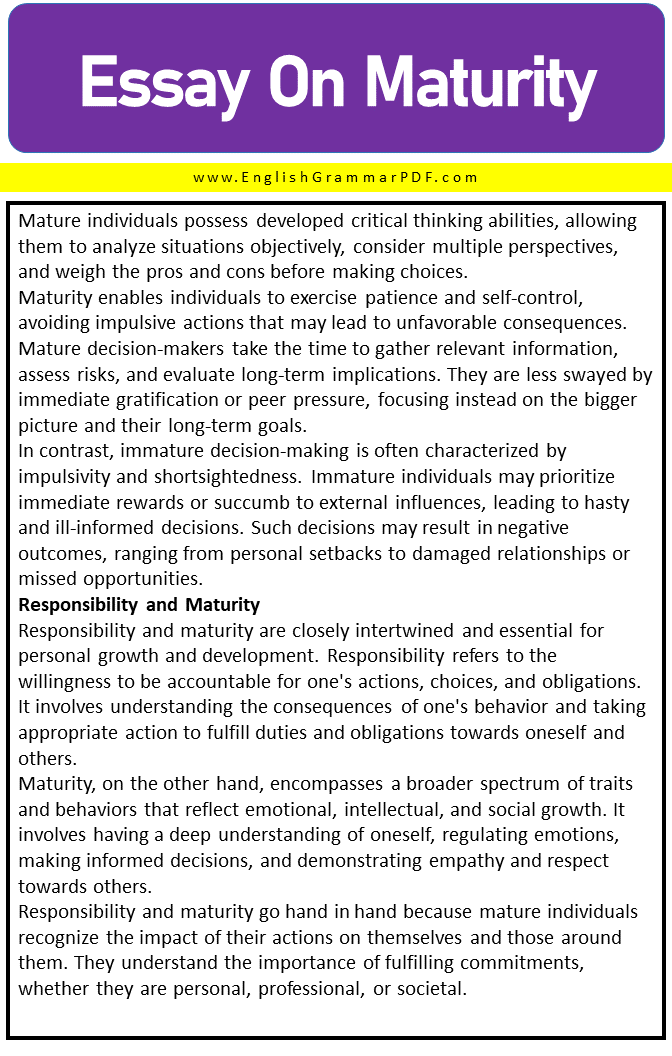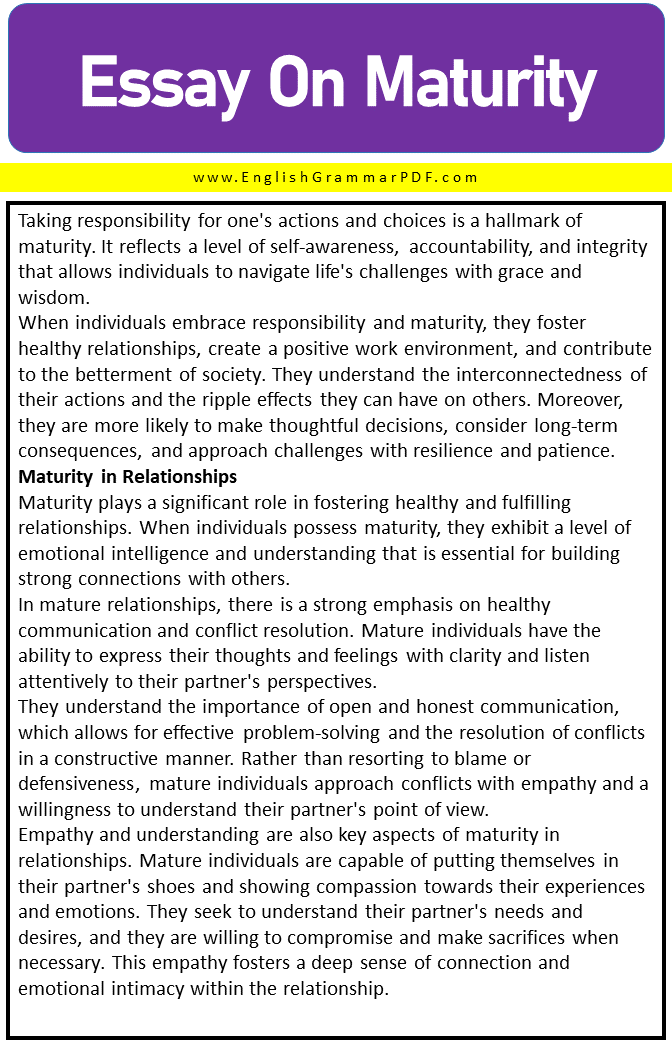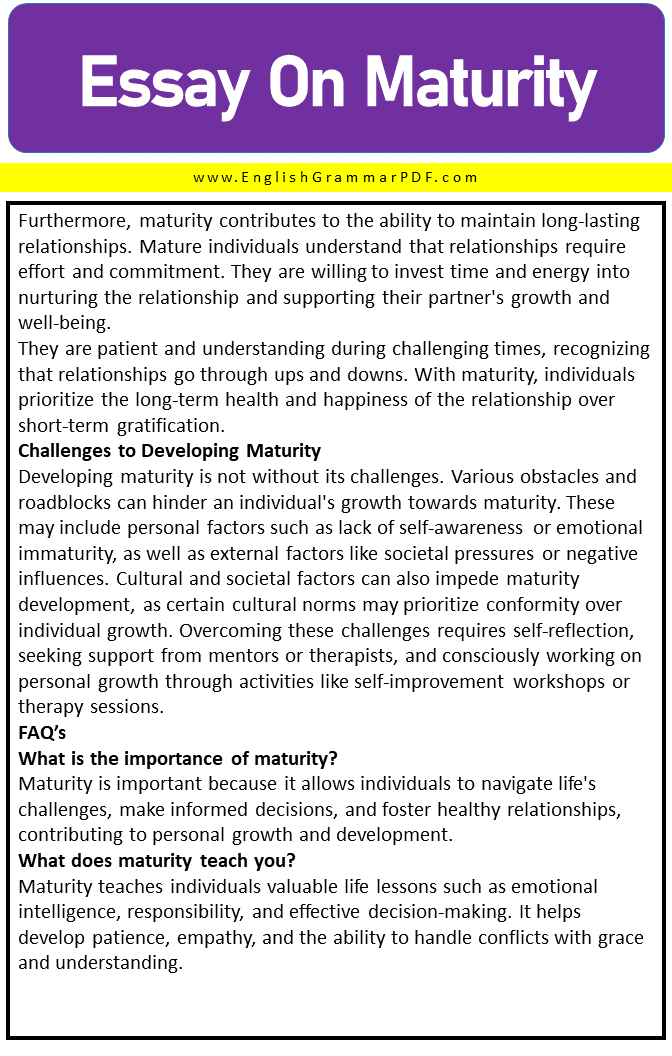Essay On Maturity
Outline of Essay:
- Introduction
- Development of Maturity
- Emotional Intelligence and Maturity
- Decision-Making and Maturity
- Responsibility and Maturity
- Maturity in Relationships
- Challenges to Developing Maturity
Introduction
Maturity is a multifaceted concept that encompasses various aspects of personal growth and development. It refers to the state of being fully developed in terms of biological, cognitive, psychological, and emotional aspects. Maturity plays a crucial role in an individual’s ability to navigate life’s challenges, make informed decisions, and foster healthy relationships. This essay explores the different dimensions of maturity and highlights its significance in various areas of life.
Development of Maturity
The development of maturity encompasses various aspects, including biological, cognitive, psychological, and emotional dimensions. Biologically, individuals go through stages of physical development, such as puberty, which marks the maturation of the body. Cognitive maturity involves the advancement of thinking abilities, enabling individuals to engage in more complex reasoning and problem-solving.
Psychological and emotional growth play a crucial role in achieving maturity as individuals learn to regulate their emotions, develop a sense of identity, and gain a deeper understanding of themselves. Additionally, societal and cultural influences shape the development of maturity by instilling social norms, values, and expectations that individuals internalize and incorporate into their growth process.
Emotional Intelligence and Maturity
Emotional intelligence (EI) refers to the ability to recognize, understand, and manage one’s own emotions, as well as to empathize and effectively interact with the emotions of others. It involves being aware of one’s feelings, controlling emotional reactions, and using emotions to facilitate decision-making and social interactions. EI encompasses components such as self-awareness, self-regulation, empathy, and social skills.
Emotional intelligence plays a vital role in the development of maturity. It enables individuals to navigate various life situations with wisdom and composure. By understanding and managing their emotions, mature individuals can approach challenges and conflicts with clarity and resilience. They are less likely to be overwhelmed by intense emotions and are better equipped to make thoughtful decisions rather than being driven by impulsive reactions.
Furthermore, emotional intelligence contributes to maturity by fostering empathy and understanding. Mature individuals have the capacity to put themselves in others’ shoes and comprehend their perspectives and feelings. This empathy allows them to build and maintain healthy relationships, as they can navigate conflicts with compassion and find solutions that consider the needs and emotions of others.
Examples of emotional intelligence in mature individuals can be observed in various scenarios. For instance, a mature person may remain calm and composed during a heated argument, demonstrating self-regulation and empathy by actively listening and responding thoughtfully. They may also display emotional resilience by bouncing back from setbacks and failures, using their emotional intelligence to learn and grow from those experiences.
Decision-Making and Maturity
Decision-making and maturity are closely intertwined concepts that significantly impact an individual’s life. Maturity plays a vital role in enhancing decision-making skills and outcomes. Mature individuals possess developed critical thinking abilities, allowing them to analyze situations objectively, consider multiple perspectives, and weigh the pros and cons before making choices.
Maturity enables individuals to exercise patience and self-control, avoiding impulsive actions that may lead to unfavorable consequences. Mature decision-makers take the time to gather relevant information, assess risks, and evaluate long-term implications. They are less swayed by immediate gratification or peer pressure, focusing instead on the bigger picture and their long-term goals.
In contrast, immature decision-making is often characterized by impulsivity and shortsightedness. Immature individuals may prioritize immediate rewards or succumb to external influences, leading to hasty and ill-informed decisions. Such decisions may result in negative outcomes, ranging from personal setbacks to damaged relationships or missed opportunities.
Responsibility and Maturity
Responsibility and maturity are closely intertwined and essential for personal growth and development. Responsibility refers to the willingness to be accountable for one’s actions, choices, and obligations. It involves understanding the consequences of one’s behavior and taking appropriate action to fulfill duties and obligations towards oneself and others.
Maturity, on the other hand, encompasses a broader spectrum of traits and behaviors that reflect emotional, intellectual, and social growth. It involves having a deep understanding of oneself, regulating emotions, making informed decisions, and demonstrating empathy and respect towards others.
Responsibility and maturity go hand in hand because mature individuals recognize the impact of their actions on themselves and those around them. They understand the importance of fulfilling commitments, whether they are personal, professional, or societal.
Taking responsibility for one’s actions and choices is a hallmark of maturity. It reflects a level of self-awareness, accountability, and integrity that allows individuals to navigate life’s challenges with grace and wisdom.
When individuals embrace responsibility and maturity, they foster healthy relationships, create a positive work environment, and contribute to the betterment of society. They understand the interconnectedness of their actions and the ripple effects they can have on others. Moreover, they are more likely to make thoughtful decisions, consider long-term consequences, and approach challenges with resilience and patience.
Maturity in Relationships
Maturity plays a significant role in fostering healthy and fulfilling relationships. When individuals possess maturity, they exhibit a level of emotional intelligence and understanding that is essential for building strong connections with others.
In mature relationships, there is a strong emphasis on healthy communication and conflict resolution. Mature individuals have the ability to express their thoughts and feelings with clarity and listen attentively to their partner’s perspectives.
They understand the importance of open and honest communication, which allows for effective problem-solving and the resolution of conflicts in a constructive manner. Rather than resorting to blame or defensiveness, mature individuals approach conflicts with empathy and a willingness to understand their partner’s point of view.
Empathy and understanding are also key aspects of maturity in relationships. Mature individuals are capable of putting themselves in their partner’s shoes and showing compassion towards their experiences and emotions. They seek to understand their partner’s needs and desires, and they are willing to compromise and make sacrifices when necessary. This empathy fosters a deep sense of connection and emotional intimacy within the relationship.
Furthermore, maturity contributes to the ability to maintain long-lasting relationships. Mature individuals understand that relationships require effort and commitment. They are willing to invest time and energy into nurturing the relationship and supporting their partner’s growth and well-being.
They are patient and understanding during challenging times, recognizing that relationships go through ups and downs. With maturity, individuals prioritize the long-term health and happiness of the relationship over short-term gratification.
Challenges to Developing Maturity
Developing maturity is not without its challenges. Various obstacles and roadblocks can hinder an individual’s growth towards maturity. These may include personal factors such as lack of self-awareness or emotional immaturity, as well as external factors like societal pressures or negative influences. Cultural and societal factors can also impede maturity development, as certain cultural norms may prioritize conformity over individual growth. Overcoming these challenges requires self-reflection, seeking support from mentors or therapists, and consciously working on personal growth through activities like self-improvement workshops or therapy sessions.
FAQ’s
What is the importance of maturity?
Maturity is important because it allows individuals to navigate life’s challenges, make informed decisions, and foster healthy relationships, contributing to personal growth and development.
What does maturity teach you?
Maturity teaches individuals valuable life lessons such as emotional intelligence, responsibility, and effective decision-making. It helps develop patience, empathy, and the ability to handle conflicts with grace and understanding.
Download the PDF of the Essay:
Explore More Essays:

